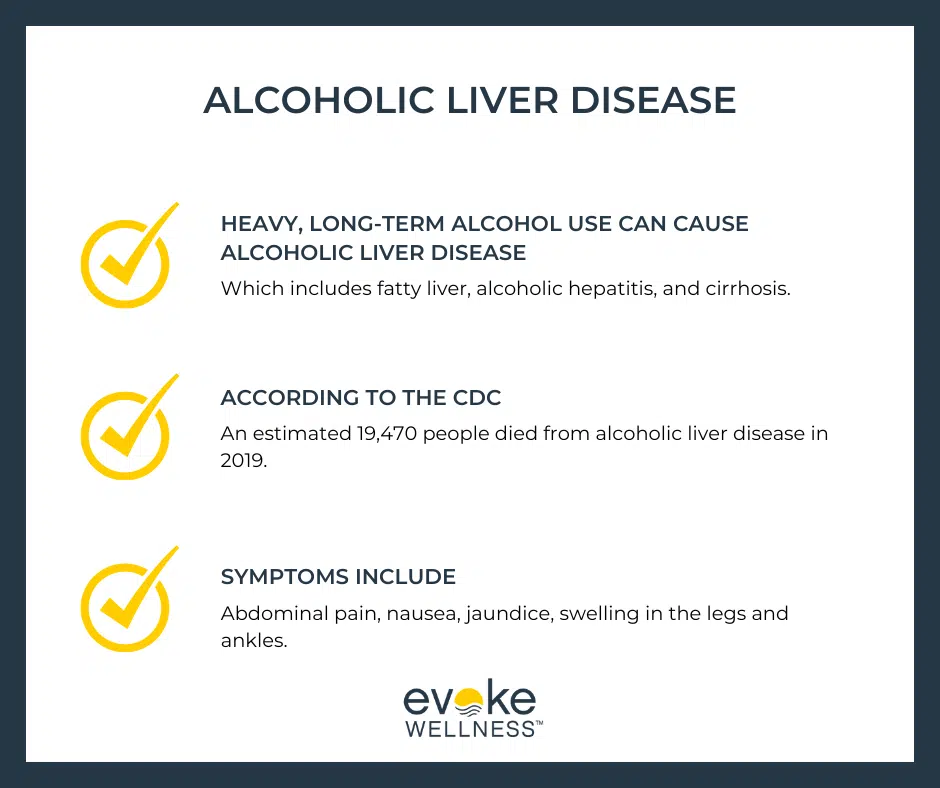Are you concerned about your drinking habits or those of a loved one? Alcohol abuse and addiction pose serious risks to your health, relationships, and overall well-being. Recent studies show that excessive alcohol consumption contributes to over 95,000 deaths annually in the United States. As a depressant, alcohol impairs judgment and coordination while damaging vital organs over time. At Evoke Wellness at Miramar, we understand the complexities of alcohol dependency and offer comprehensive solutions.
Learn how our expert team can guide you toward lasting recovery and reclaim control of your life.
Together, let’s embrace the journey to recovery and the promise of a new beginning. Call us at (833) 819-6066 today or reach out online.
The Health Risks of Alcohol Abuse
Deadly Statistics
Alcohol abuse poses severe health risks that can be life-threatening. According to the National Institute on Alcohol Abuse and Alcoholism (NIAAA), alcohol-related emergency department visits account for a staggering 5 million annually in the United States. Chest pain is a common complaint among individuals with alcohol use disorder (AUD).
Cardiovascular Dangers
Individuals struggling with AUD face a significantly higher risk of developing cardiovascular issues like chest pain and heart disease compared to non-drinkers. Alcohol can weaken the heart muscle, disrupt rhythms, and elevate blood pressure – all contributing to alcohol-induced chest pain.
Symptoms & Mechanisms
This chest pain can manifest in various forms – from mild discomfort to severe, crushing sensations. It may occur immediately after drinking or as a delayed reaction due to esophageal spasms, gastric reflux, and the direct cardiac effects of alcohol consumption.
Comprehensive Care
At Evoke Wellness at Miramar, specialized substance abuse treatment programs are offered, including a men’s rehab program and a veterans program. These address alcohol addiction alongside co-occurring conditions like depression that can exacerbate alcohol-related chest pain. Their comprehensive approach combines evidence-based therapies, medical interventions, and holistic modalities to promote lasting recovery and improved overall well-being.
Liver Damage
Excessive alcohol consumption can lead to severe and potentially life-threatening liver damage. The liver is vital for filtering toxins from the body, but alcohol is a toxin itself.

Increased Cancer Risk
- Chronic alcohol abuse may increase the risk of developing liver cancer.
- Research shows the more alcohol consumed, the higher the risk.
- Heavy drinkers have a 2-3 times greater risk compared to non-drinkers.
Seek professional alcohol addiction treatment before irreversible liver damage occurs. Evoke Wellness offers detox and rehabilitation programs tailored to each individual’s needs. Early intervention provides the best chance for recovery and preventing fatal organ damage.
Heart Disease
Alcohol’s Impact on the Heart
Alcohol abuse and addiction can have severe consequences for heart health. According to the Cleveland Clinic, abstaining from alcohol for just 30 days can lower blood pressure and cholesterol levels. Heavy, long-term alcohol use increases the risk of developing heart disease, heart failure, stroke, and other cardiovascular problems.
Heart Risks of Alcohol Abuse
- Cardiomyopathy (weakened heart muscle)
- Arrhythmia (irregular heartbeat)
- High blood pressure (hypertension)
- Stroke and heart attacks
Chronic alcoholism can damage virtually every organ system, including the cardiovascular system. Prolonged alcohol exposure causes physical dependence, tolerance, and brain changes that drive compulsive drinking despite health consequences.
Reducing Heart Risks Through Treatment
By undergoing a medically-supervised alcohol detox, individuals can take the first step towards improving heart health and reducing alcohol-related risks. Comprehensive addiction treatment combining detox, therapy, and ongoing support can help achieve lasting sobriety and maintain the benefits of quitting alcohol for the heart and overall well-being.
Brain and Nervous System Problems
Long-Term Cognitive Impairment
Excessive alcohol consumption can lead to long-term cognitive impairment. According to a study by the National Institute on Alcohol Abuse and Alcoholism, alcohol abuse causes brain damage that impairs abilities like memory, problem-solving, and emotional regulation. The damage worsens over time with continued alcohol abuse.
Increased Risk of Dementia
Heavy drinking over many years significantly increases the risk of developing dementia, including Alzheimer’s disease. Research published in The Lancet Public Health found that former drinkers had a 17% higher risk of dementia compared to those who continued moderate drinking.
Nerve Damage and Numbness
Alcohol abuse can cause nerve damage (neuropathy) resulting in numbness, pain, and muscle weakness. As noted by the National Institute of Neurological Disorders and Stroke, alcohol-related nerve damage typically starts in the feet and moves upward, potentially impairing digestion, urination, circulation, and other functions.
Cancer
Excessive alcohol consumption is a known risk factor for several types of cancer. According to the National Cancer Institute, alcohol use has been linked to an increased risk of cancers of the mouth, throat, voice box, esophagus, liver, colon and rectum, and breast (in women).
Mechanisms Involved
- Alcohol can damage tissues in the body, making cells more vulnerable to cancer-causing agents.
- It may also increase levels of estrogen, a sex hormone linked to breast cancer risk.
- Alcohol metabolism produces acetaldehyde, a toxic chemical that can damage DNA and proteins.
Statistics & Studies
A 2021 study estimated that 4.1% of all new cancer cases globally in 2020 were attributable to alcohol consumption. This amounted to over 741,000 cases, with the highest burden among men.
Even moderate drinking may increase cancer risk. Researchers found that people who had 1-3 alcoholic drinks per day had a modestly increased risk of some cancers compared to non-drinkers.
Seeking professional treatment through an alcohol detox and rehab program can help individuals overcome addiction and reduce their cancer risk from alcohol use.
What are the Dangers of Alcoholism?
Long-Term Health Risks
Chronic alcohol abuse poses severe risks to your physical and mental wellbeing. Heavy drinking can severely damage the liver, leading to cirrhosis – a leading preventable cause of death in the US. It also rewires the brain, causing learning difficulties, memory issues, depression, and impaired emotional control. In extreme cases, alcoholism increases the risk of dementia.
Life-Threatening Complications
Alcohol is considered a class 1 carcinogen, with strong evidence linking it to various cancers like breast, colon, liver, and esophageal. The more you drink, the higher your cancer risk. Severe alcohol withdrawal can trigger life-threatening delirium tremens (DTs) – involving hallucinations, seizures, and rapid vital sign changes – necessitating immediate medical attention.
The Path to Recovery
Attempting to quit alcohol abruptly without support can be extremely dangerous and raises relapse risks. Medically supervised alcohol detox programs like Evoke Wellness provide a safe, controlled environment to manage withdrawal symptoms – a crucial first step towards comprehensive addiction treatment. Therapies, medication, and ongoing support are essential for achieving lasting sobriety.
What are the Short-Term Effects of Alcohol Abuse?
Alcohol abuse can lead to a range of concerning short-term effects that impact your physical and mental well-being. These include:
Impaired Judgment & Coordination
- Slurred speech, impaired vision, and delayed reaction time make routine tasks dangerous.
- Increased risk of accidents, falls, and injuries due to lack of coordination. According to the CDC, alcohol is involved in about 60% of fatal burn injuries, drownings, and homicides each year.
Risky Behavior
- Lowered inhibitions can lead to poor decision-making, aggressive outbursts, and risky sexual behavior.
- College students are especially prone, with alcohol being a factor in around 97,000 cases of sexual assault or date rape each year.
Physical Effects
- Nausea, vomiting, headaches, dehydration, and hangovers are common.
- Increased blood pressure, irregular heartbeat, and difficulty breathing can occur with binge drinking.
Mental Effects
- Mood swings, anxiety, and depression often accompany alcohol abuse.
- Memory lapses or blackouts are possible due to alcohol’s effects on the brain.
Even short-term alcohol abuse can have severe consequences. If you’re struggling, Evoke Wellness at Miramar offers comprehensive inpatient and outpatient programs to help you reclaim your life.
What are the Long-Term Effects of Alcohol Misuse?
Liver Damage and Disease
Chronic heavy drinking is a leading cause of liver damage. Over time, alcohol abuse can lead to fatty liver disease, inflammation (alcoholic hepatitis), and permanent scarring (cirrhosis) that impairs liver function. In severe cases, cirrhosis can be life-threatening.
Brain and Cognitive Impairment
Alcohol misuse can rewire the brain, causing difficulty with learning, memory, emotional control, and increased risk of mental health issues like depression. Prolonged abuse may elevate the risk of dementia and other cognitive deficits.
Cardiovascular Complications
Excessive drinking puts significant stress on the heart and cardiovascular system. It raises the likelihood of irregular heartbeats, high blood pressure, heart disease, and stroke.
Increased Cancer Risk
Numerous studies link alcohol consumption to higher risks of various cancers, including breast, colon, rectal, liver, and esophageal cancer. Alcohol is classified as a carcinogen that can damage DNA and allow other cancer-causing agents to penetrate cells more easily.
Effective Treatment Options
While the long-term effects of alcohol misuse can be severe, comprehensive alcohol addiction treatment programs like those at Evoke Wellness offer personalized, evidence-based care to help individuals break free and develop tools for lasting sobriety. With support, recovery is possible.
How to Get Help for Alcohol Abuse and Addiction
Recognize the Problem
Admitting you have a problem with alcohol is the crucial first step. According to Evoke Wellness, denial is common among those struggling with alcoholism. Carefully evaluate your drinking habits – if alcohol interferes with work, relationships, or health, you may need professional help.
Seek Treatment Options
There are various programs designed to assist with alcohol addiction recovery. Evoke Wellness offers comprehensive treatment, including:
- Medical drug and alcohol detox to safely withdraw under supervision
- Residential treatment with therapy and counseling
- Dual diagnosis care for co-occurring mental health issues
Get Support
Recovering from alcohol abuse is challenging, but support can make a difference. Involve loved ones in your journey, and consider:
- Joining a peer support group like Alcoholics Anonymous
- Working with an addiction counselor or therapist
- Utilizing aftercare programs
The path to sobriety takes courage, commitment, and professional care. By taking that first step, you can reclaim your life from the grips of alcohol addiction.
Conclusion
In conclusion, alcohol abuse and addiction pose serious dangers to your health, relationships, and overall well-being. By understanding the risks and recognizing the signs of problematic drinking, you can take proactive steps to protect yourself and seek help if needed. If you’re struggling with alcohol use, don’t hesitate to reach out. With proper treatment and support, recovery is possible. Take control of your health and future by addressing alcohol abuse today.
Begin Your Journey with Evoke Wellness at Miramar
If you or a loved one is considering treatment, Evoke Wellness at Miramar invites you to contact us. Our compassionate team is ready to answer your questions, discuss your needs, and help you take the first steps toward recovery. In Miramar, you’ll find more than just a treatment program – you’ll discover a community dedicated to your wellness and success. Together, let’s embrace the journey to recovery and the promise of a new beginning. Call us at (833) 819-6066 today or reach out online.


